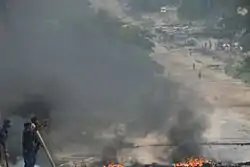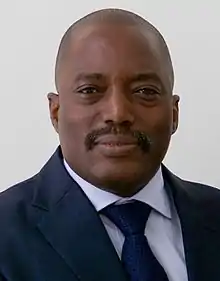December 2016 Congolese protests
On 20 December 2016 the Democratic Republic of the Congo's president, Joseph Kabila, announced that he would not leave office despite the end of his constitutional term. Protests subsequently broke out across the country, which had never had a peaceful transfer of power since it gained independence in 1960. The protests were met with the government's blocking of social media,[6] and violence from security forces which left dozens dead. Foreign governments condemned the attacks against protesters.
| December 2016 Congolese protests | |||
|---|---|---|---|
 Streets of Kinshasa during the protests | |||
| Date | 14–23 December 2016 | ||
| Location | |||
| Caused by |
| ||
| Goals |
| ||
| Methods | |||
| Resulted in |
| ||
| Parties to the civil conflict | |||
| |||
| Lead figures | |||
| |||
| Casualties | |||
| Death(s) |
| ||
| Injuries | dozens | ||
| Detained | 460[5] | ||
On 23 December an agreement was proposed between the main opposition group and the Kabila led-government under which the latter agreed not to alter the constitution and to leave office before the end of 2017.[4] Under the agreement opposition leader Étienne Tshisekedi will oversee that the deal is implemented and the country's Prime Minister will be appointed by the opposition.[4]
Background

In the wake of the 2014 Burkinabé uprising, the Democratic Republic of the Congo experienced a series of protests (e.g. the 2015 Congolese protests) in which Congolese citizens demanded that President Joseph Kabila not alter the presidential term limits in the country's constitution so that he could run for another term in office and not delay the country's planned elections.[7] These protests and others in 2016 were often violent and took place within the broader context of frequent mass protests against authoritarian governments in Africa (e.g. in Burundi, Uganda, Ethiopia, Gabon, Republic of the Congo, Zimbabwe, and Cameroon).
In 2016 Kabila's government was mentioned in the Panama Papers and it asked and received permission from the country's constitutional court to allow Kabila to remain in power after his term ended if a successor had not been elected.[8] Following protests in mid-2016 and calls by members of the opposition to hold talks Kabila's government announced the appointment of several nominally opposition politicians into cabinet posts but continued to claim that elections would be impossible to hold due to financial constraints and that the earliest possible date for elections would be April 2018.[9] In September, the United States imposed financial sanctions on two of Kabila's advisors, Major General Gabriel Amisi Kumba and John Numbi, preventing the two from accessing assets within the US and engaging in financial transactions with US citizens.[10] In December, the United States Department of the Treasury’s Office of Foreign Assets Control added Interior Minister Évariste Boshab and intelligence agency leader Kalev Mutondo to its sanctions list,[11] while the European Union froze assets and banned travel of Ilunga Kampate, leader of the DRC's Republican Guard, as well as six more unnamed officials.[12]
Events
On 14 December 42 people were arrested in Goma according to Human Rights Watch.[13] Meanwhile, an anti-Kabila protest was held outside the University of Kinshasa.[13]
On 20 December security forces killed 19 civilians in Kinshasa, 6 civilians in Boma, 4 civilians in Matadi, and 5 civilians in Lubumbashi.[1] Protesters held red penalty cards[14] and blew whistles signifying the end of Kabila's term in office and their desire for him to leave power.[15] Protesters in Kinshasa were attacked by security forces with tear gas, water cannons and live ammunition.[14] According to the United Nations, at least 113 people had been arrested between the 17th and 19th.[16]
On 21 December, protests in the country's second largest city, Lubumbashi, left 10 protesters dead and 47 wounded according to a local NGO.[17] Other protests in cities across the country left a total of at least 26 dead for the day, according to the Human Rights Watch, which said that military and police personnel had been deployed in Lubumbashi and Kinshasa.[16] The government reported only nine deaths,[16] while saying that the police had arrested 275 people.[17]
On 23 December an agreement was proposed between the main opposition group and the Kabila led-government under which the latter agreed not to alter the constitution and to leave office before the end of 2017.[4] Under the agreement opposition leader Étienne Tshisekedi will oversee that the deal is implemented and the country's Prime Minister will be appointed by the opposition.[4]
Mediation efforts by DR Congo's Roman Catholic Church
DR Congo's Roman Catholic Church has been mediating talks between members of the country's political opposition and the government.[17][18]
International reactions
.svg.png.webp) Belgium: The Belgian government said it would review its relationship with the DRC.[19]
Belgium: The Belgian government said it would review its relationship with the DRC.[19] France: The French government called on the European Union to review its relationship with the DRC.[19][20] The foreign minister, Jean-Marc Ayrault, said, "We can’t continue to pretend as if nothing is happening".[19]
France: The French government called on the European Union to review its relationship with the DRC.[19][20] The foreign minister, Jean-Marc Ayrault, said, "We can’t continue to pretend as if nothing is happening".[19] Germany: The German foreign office stated on 21 December that "The negotiations on development cooperation scheduled to take place next year will be postponed indefinitely. The German Government reserves the right to take further steps."[21]
Germany: The German foreign office stated on 21 December that "The negotiations on development cooperation scheduled to take place next year will be postponed indefinitely. The German Government reserves the right to take further steps."[21] United Kingdom: Tobias Ellwood, the British Minister for Africa and the Middle East, said, "The government must urgently set a date for timely elections to prevent the situation from escalating further."[19]
United Kingdom: Tobias Ellwood, the British Minister for Africa and the Middle East, said, "The government must urgently set a date for timely elections to prevent the situation from escalating further."[19] United States: The American government released a statement saying, "We remain ready to impose additional sanctions on those – whether government or opposition – who perpetrate violence or impede DRC’s democratic institutions".[19]
United States: The American government released a statement saying, "We remain ready to impose additional sanctions on those – whether government or opposition – who perpetrate violence or impede DRC’s democratic institutions".[19]
Aftermath
By late January Congo's Catholic Bishops Conference (CENCO) announced that the December 31st deal was at risk of collapsing as Kabila's regime and the opposition disagreed over appointments to the electoral monitoring council and ministerial posts.[22]
See also
- 2015 Congolese protests
- 2011-2012 Senegalese protests
- 2020 Congolese protests
- 2019-2020 Gambian protests
References
- "Congo Violence (Map)". Thompson Reuters. 22 December 2016. Archived from the original on 23 December 2016. Retrieved 22 December 2016.
- "Firearm stolen during protests outside the DRC embassy recovered". SABC Digital News. 20 December 2016.
- "Members of the Congolese community in Belgium clash with police in anti-Kabila protests". CCTV Africa. 20 December 2016.
- "Opposition says Congo politicians agree Kabila transition deal". Reuters. 23 December 2016.
- "Congo forces killed 40, arrested 460 in Kabila protests - U.N". Reuters. 23 December 2016.
- "Deadly protests rock Democratic Republic of Congo = 20 December 2016". Reuters.
- "Congo forces arrest dozens after deadly anti-Kabila protests". Reuters. 22 December 2016.
- "Kabila's Strengths and Vulnerabilities as DRC Deadline Nears". International Crisis Group. 11 December 2016.
- "Deadly clashes in Kinshasa as Kabila stays on as DR Congo president". FRANCE 24 English. 20 December 2016.
- Burke, Jason (28 September 2016). "US imposes sanctions on top DRC officials after election delay". The Guardian. Retrieved 23 December 2016.
- "Treasury Sanctions Two Congolese Government Officials". United States Department of the Treasury. 12 December 2016. Retrieved 23 December 2016.
- "U.S. steps up sanctions on Congo officials, Europe joins in". Reuters. 12 December 2016. Retrieved 23 December 2016.
- Burke, Jason (19 December 2016). "Congo on a knife-edge as opposition leader calls for Kabila to step down". The Guardian. Retrieved 22 December 2016.
- "Protests erupt in Kinshasa as Kabila's mandate expires". CCTV Africa. 20 December 2016.
- "At least 20 killed in Congo protests - BBC News = 21 December 2016". BBC News.
- "Congo A 'Powder Keg' As Security Forces Crack Down On Whistling Demonstrators". NPR. 21 December 2016. Retrieved 23 December 2016.
- Almost 300 arrested as anti-president protests subside in Congo, Reuters, Published: Wed 21 December, 2016 1:37pm EST
- Burke, Jason (20 December 2016). "'20 dead' in DRC protests after president's term expires". The Guardian. Retrieved 22 December 2016.
- Burke, Jason (21 December 2016). "Pressure mounts on Kabila amid crackdown on DRC opposition". The Guardian. Retrieved 23 December 2016.
- "RDC : Kabila passe en force, scènes d'émeute dans la capitale malgré les appels au calme". Le Monde. 20 December 2016. Retrieved 23 December 2016.
- "Germany suspends aid talks with Congo after Kabila overstays". Reuters. 21 December 2016.
- "Congo's Catholic church warns Kabila deal risks falling apart". Reuters. 23 January 2017.